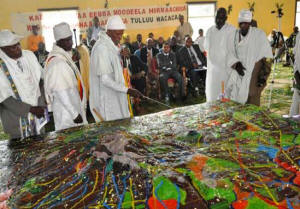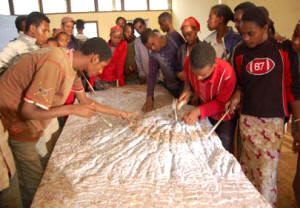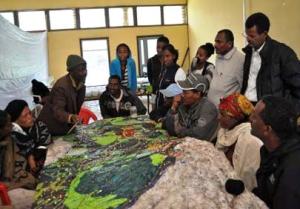Participatory 3D Modelling to document the Traditional Ecological Knowledge within the historical Wechecha Mountain Complex, Ethiopia

 This 1:10,000 scale (2 x vertical exaggeration) Participatory 3D Model (P3DM) represents the Wechecha Mountain Complex, Oromiya Regional State, adjacent to Wolmera and Sebeta Awas Woreda, Ethiopia. It was completed in year 2009. It measures 2.4 x 2.8 m (672 km2 on the ground) and is the 2nd P3DM made in Ethiopia after the one in Bale.
This 1:10,000 scale (2 x vertical exaggeration) Participatory 3D Model (P3DM) represents the Wechecha Mountain Complex, Oromiya Regional State, adjacent to Wolmera and Sebeta Awas Woreda, Ethiopia. It was completed in year 2009. It measures 2.4 x 2.8 m (672 km2 on the ground) and is the 2nd P3DM made in Ethiopia after the one in Bale.
The objective of the exercise was to document the Traditional Ecological Knowledge (TEK) of resident communities, and add value and authority to it in order to increase the value external authorities would attach to it when it comes to collaborative natural resource management. A second objective of the exercise was to enhance the transfer of TEK the younger generations.

 Over 40 students and representatives from youth groups constructed the blank model. Residents of the area, especially elders, were invited to populate the map with their spatial knowledge. In the process information about the mountain area has been shared across generations and between local communities and other stakeholders, opening the door for deeper discussions on the sustainable management and safeguarding of both local culture and environment.
Over 40 students and representatives from youth groups constructed the blank model. Residents of the area, especially elders, were invited to populate the map with their spatial knowledge. In the process information about the mountain area has been shared across generations and between local communities and other stakeholders, opening the door for deeper discussions on the sustainable management and safeguarding of both local culture and environment.
The local Governors were very supportive. They played an active role in the process together with the organisers.
This exercise has been a follow-up to the regional P3DM training organised by CTA and ERMIS-Africa in Nessuit, Kenya in 2006 where a number of Eastern Africa delegates from NGOs and CBOs were trained in organising and conducting P3DM exercises. Dr. Belay attended the training and put acquired skills into practice in replicating the process in Bale. MELCA- Ethiopia or ‘Movement for Ecological Learning and Community Action’, was founded in 2004, to work for the conservation of ecosystem and for the revival and enhancement of Traditional Ecological Knowledge and to protect the rights of communities in Ethiopia through research, advocacy, endogenous development and intergenerational learning.
The word ‘melca’ means ford both in Amharic and Oromo language – two of the widely spoken languages of Ethiopia. It means a crossing point on a river, which is symbolically used to indicate the need to take people away from their misconception about local people and culture to an understanding and appreciation of traditional ecological knowledge. A river also signifies linkage with a source. If the source dries, the river also dries. MELCA emphasizes that culture is the source of identity and wisdom, and that the destruction or degradation of culture will result lose of a vast amount of knowledge and identity.
MELCA works with local communities, elders, schools and youth in the Sheka Forest region in southeast Ethiopia, the Bale Mountains National Park, and Menagesha Suba forest near to Addis Ababa. MELCA is also a regional node for the African Biodiversity Network.
Recommended readings:
Belay M. 2009. Participatory 3D Model of the historical Wechecha mountain complex, Ethiopia. PPgis.Net Blog
Belay M. 2009. Inauguration of the Participatory 3 Dimensional Model of the Wechecha Mountain Complex. MELCA, Ethiopia, 19 August 2009
Location map:
Follow us!